If you’re looking to build kindness and confidence, I recommend exploring some of the best self-compassion workbooks. They offer practical exercises like journaling, mindfulness, and emotion exploration tailored for various needs, from teens to adults. These books can help reduce self-criticism, boost emotional resilience, and promote genuine self-love. If you’re curious about which ones fit your goals and how to choose them, there’s more to discover below.
Key Takeaways
- Highlighting top-rated workbooks designed to enhance self-kindness, emotional resilience, and confidence through practical exercises.
- Featuring diverse options tailored for teens, adults, children, and specific cultural or mental health needs.
- Emphasizing evidence-based activities like journaling, mindfulness, and emotion exploration for sustainable growth.
- Including considerations for physical format, accessibility, and supplemental resources to maximize engagement.
- Providing guidance on selecting workbooks suited to individual experience levels, challenges, and personal preferences.
The Mindful Self-Compassion Workbook
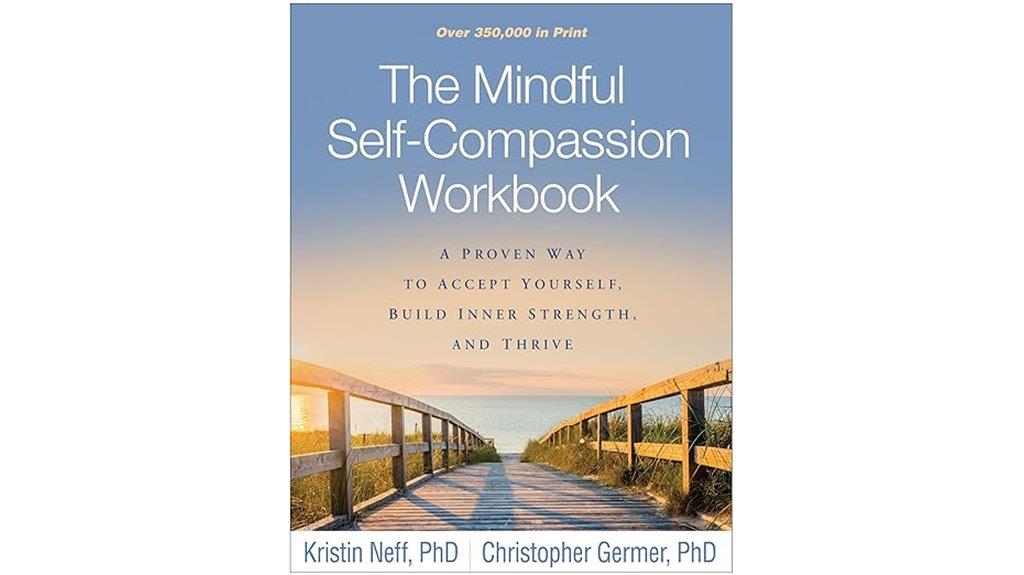
If you’re looking for a practical, accessible way to develop self-compassion, *The Mindful Self-Compassion Workbook* by Kristin Neff and Christopher Germer is an excellent choice. I found it incredibly helpful, especially for reducing harsh self-criticism and increasing mindfulness. The workbook’s clear structure offers short chapters filled with real-world examples, reflection prompts, and exercises like journaling, meditation, and emotion exploration. It’s designed for ongoing practice, making it a lifelong tool. Many users, including those with trauma or anxiety, report life-changing results—more self-awareness, better emotional regulation, and a kinder relationship with themselves.
Best For: individuals seeking a practical, accessible, and lifelong tool to cultivate self-compassion, reduce self-criticism, and enhance mindfulness, especially those dealing with anxiety, trauma, or emotional distress.
Pros:
- Well-structured with short, engaging chapters and real-world examples that make learning accessible.
- Offers practical exercises like journaling, meditation, and emotion exploration that promote ongoing self-growth.
- Highly praised for its effectiveness in reducing harsh self-criticism and improving emotional regulation.
Cons:
- Some users have experienced minor issues such as delayed shipping or physical defects like shorter covers.
- Requires consistent practice to see significant benefits, which may be challenging for some individuals.
- Does not require prior knowledge, but beginners might need extra time to fully engage with some exercises.
Self-Compassion Workbook for OCD
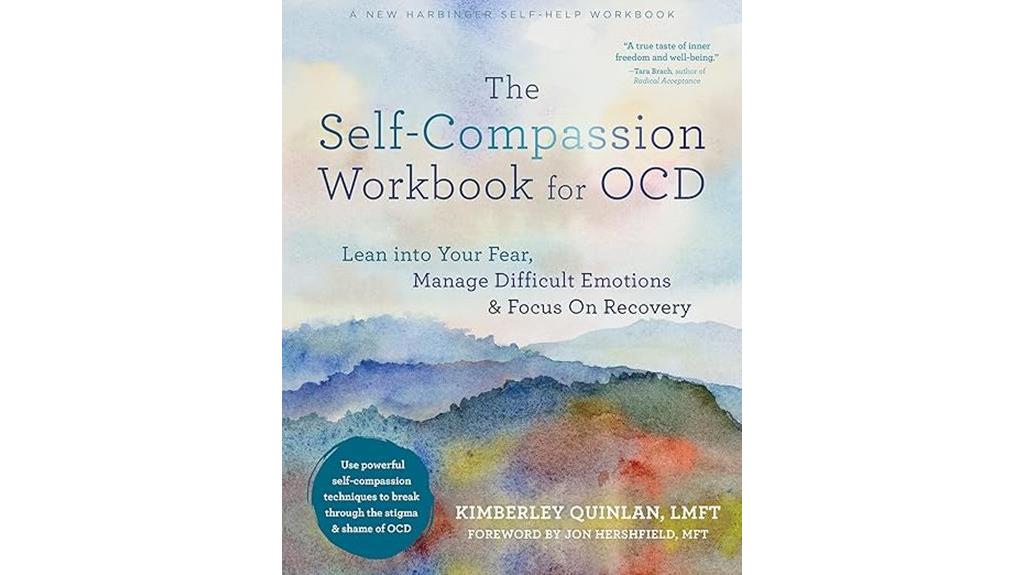
Are you struggling with self-criticism while managing OCD? I understand how harsh self-judgment can make everything feel heavier. The Self-Compassion Workbook for OCD offers clear, practical tools that you can start using immediately. Many find it eye-opening and transformative, helping them understand OCD better and develop kindness toward themselves. The exercises, including meditation and compassionate perspectives, fit seamlessly into daily routines, easing anxiety and improving coping skills. Despite some shipping issues, the content’s impact is profound—many say it’s been life-changing. If you’re looking to foster more self-compassion and manage OCD with gentleness, this workbook could be a crucial part of your journey.
Best For: individuals with OCD seeking to cultivate self-compassion, reduce self-criticism, and improve coping strategies through practical, easy-to-apply exercises.
Pros:
- Clear, concise, and easy-to-follow format with practical tools for immediate use
- Emphasizes the importance of self-compassion, including meditation and compassionate perspectives
- Highly recommended by users for its transformative impact on managing OCD and related anxiety
Cons:
- Some users have experienced damage or poor packaging during shipping
- The physical condition of the book may vary, affecting the overall experience
- Requires active engagement and practice to see the full benefits, which may be challenging for some readers
Self-Compassion Workbook with Practical Exercises
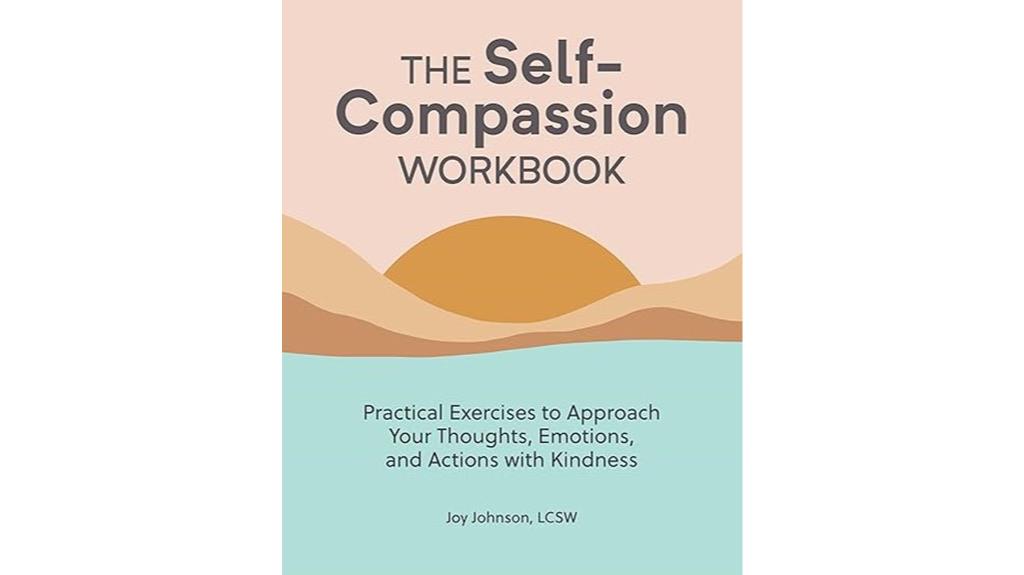
The Self-Compassion Workbook with Practical Exercises is an excellent choice for beginners seeking a straightforward, accessible way to cultivate self-kindness. I’ve found it incredibly helpful, especially through mindfulness and journaling, which deepened my understanding of my thoughts and judgments. The exercises are simple and easy to follow, making daily practice manageable. It’s especially beneficial if you’re new to self-compassion or dealing with depression, anxiety, or chronic illnesses. Although some scoring details are imperfect, the overall structure encourages patience and self-reflection. I highly recommend it for anyone looking to build kindness towards themselves in a practical, gentle way.
Best For: Beginners in self-compassion practices, individuals seeking accessible tools for mental health, and those dealing with depression, anxiety, or chronic illnesses.
Pros:
- User-friendly and easy to follow, suitable for beginners.
- Incorporates practical exercises like journaling and mindfulness that deepen self-awareness.
- Endorsed by therapists and highly regarded for personal growth and emotional well-being.
Cons:
- Self-Compassion Scale scoring may be flawed, particularly question reversals, which could misrepresent actual self-compassion levels.
- Some concepts may seem basic or familiar to those experienced in therapy or self-help, limiting novelty.
- The exercises are introductory and may lack depth for advanced practitioners.
Self-Love Workbook for Women
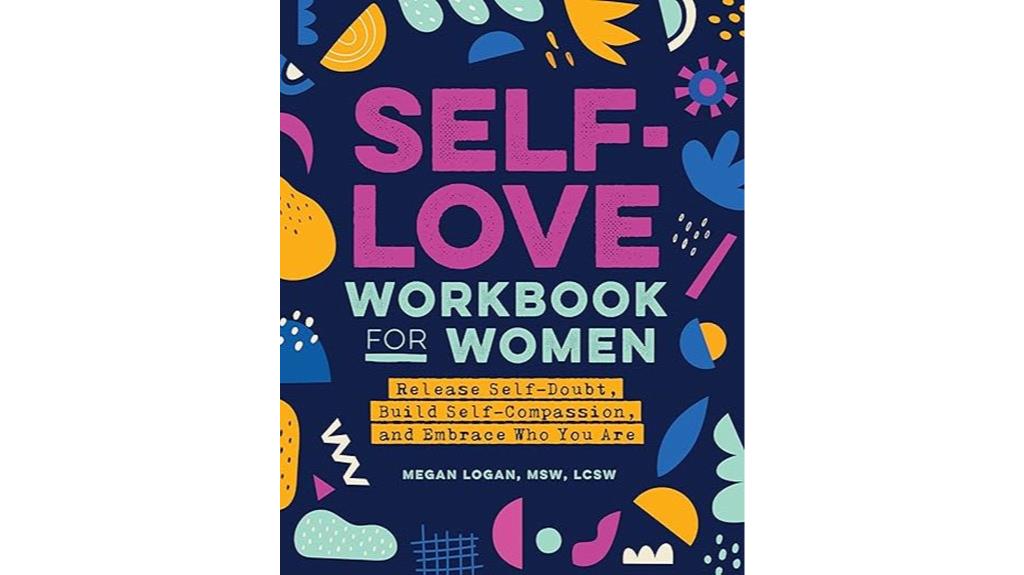
Women seeking to nurture their self-love and healing will find the Self-Love Workbook for Women particularly valuable. It offers powerful exercises, prompts, and reflections that promote self-discovery, confidence, and self-compassion. Many users report feeling more relaxed, positive, and emotionally healed after consistent use. The workbook’s organized, colorful pages make it engaging and accessible, whether you’re just starting or further along your journey. While some find it demanding time-wise, the depth of reflection it encourages is worth the effort. It’s a therapeutic, empowering resource that helps validate feelings, boost self-awareness, and foster a genuine sense of inner love.
Best For: women of all ages seeking a therapeutic, empowering tool to enhance self-love, emotional healing, and personal growth through reflective exercises.
Pros:
- Offers powerful, insightful exercises that promote self-awareness and self-compassion
- Well-organized, colorful pages make the workbook engaging and accessible
- Supports mental well-being and has been praised for its therapeutic and transformative effects
Cons:
- Some exercises may require significant time and energy, challenging busy schedules
- Certain prompts, like the self-compassion quiz, could be better formatted to avoid confusion
- The workbook’s depth may be emotionally intense for some users, requiring careful self-care during use
Self-Compassion Skills Workbook: 14-Day Plan to Transform Your Relationship

If you’re seeking a practical and gentle way to deepen self-compassion, the Self-Compassion Skills Workbook offers a clear, step-by-step 14-day plan designed to help you transform your relationship with yourself. It features easy-to-follow exercises that can be customized to fit your daily schedule, focusing on kindness, reflection, and emotional growth. The workbook integrates parts work, making it especially helpful for healing complex trauma, and includes access to 15 downloadable meditations by Tim Desmond. These meditations support mindful breathing, body awareness, and compassion practices, guiding you toward greater self-acceptance, resilience, and lasting well-being.
Best For: individuals seeking a gentle, practical guide to deepen self-compassion, especially those healing from trauma or complex emotional wounds.
Pros:
- Offers a clear, structured 14-day plan with customizable exercises for daily practice
- Includes access to 15 downloadable meditations that enhance mindfulness and compassion skills
- Suitable for healing complex trauma due to its integration of parts work and emotional regulation techniques
Cons:
- Some users may find the audio track labeling confusing or inconsistent with the practices described
- The circular structure at the end of sequences may be challenging for those overwhelmed or unfamiliar with self-guided practices
- Practitioners with severe trauma or dissociation should proceed slowly and seek professional support, as some exercises delve deeply into emotional layers
Self-Compassion Workbook for Kids: Mindfulness Activities to Build Emotional Strength
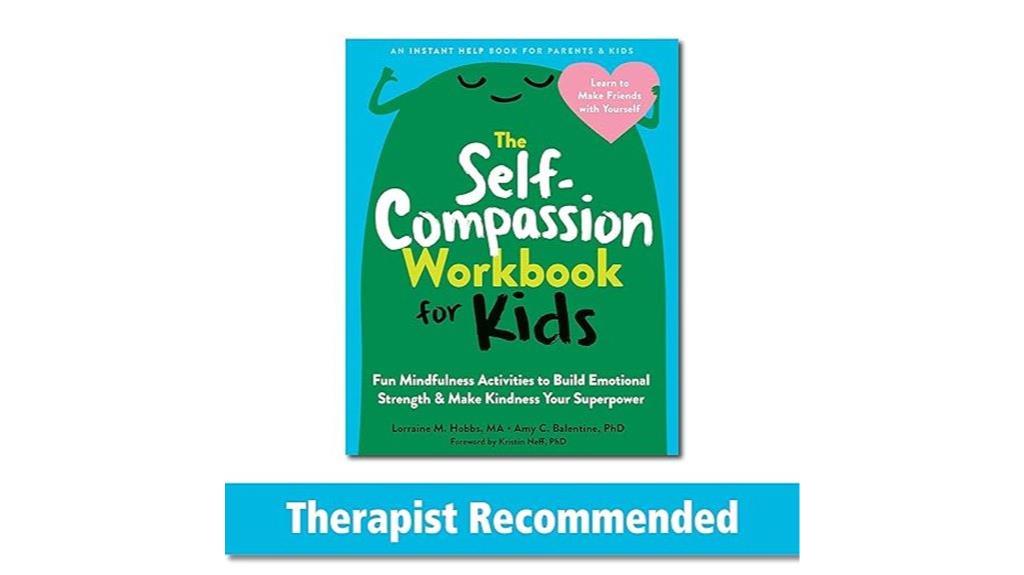
Parents, teachers, and caregivers seeking an engaging way to help children develop emotional resilience will find the Self-Compassion Workbook for Kids especially valuable. It offers fun, practical mindfulness activities that teach kids to recognize and manage their feelings with kindness. Simple exercises like rainbow breathing promote calmness and self-regulation, while others foster empathy and emotional intelligence. Designed for easy use, the workbook requires minimal materials and can be incorporated into daily routines. By building self-compassion early, children develop the emotional strength needed to handle challenges with confidence and grace, setting a foundation for lifelong well-being.
Best For: parents, teachers, and caregivers looking for an engaging, simple way to help children build emotional resilience and self-compassion through fun mindfulness activities.
Pros:
- Offers practical, easy-to-follow exercises requiring minimal materials.
- Promotes emotional awareness, self-regulation, and empathy in children.
- Suitable for a wide age range and easy to incorporate into daily routines.
Cons:
- Some activities may need adult guidance for younger children.
- May require consistent practice to see long-term benefits.
- Limited to mindfulness and emotional skills, not addressing all behavioral challenges.
Self-Compassion Workbook for Teens: Mindfulness and Compassion Skills
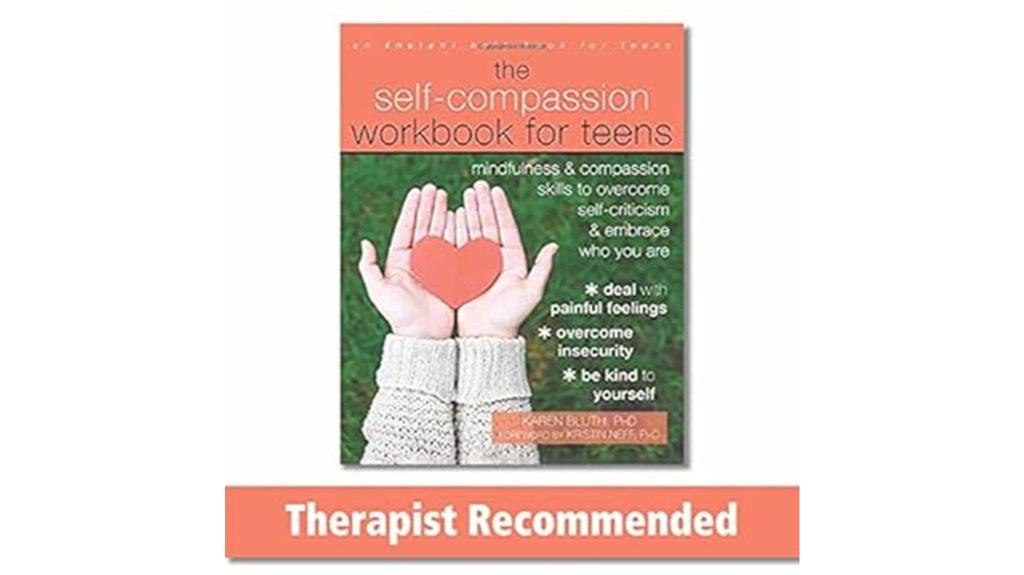
The Self-Compassion Workbook for Teens is an ideal resource for adolescents seeking practical tools to build emotional resilience and reduce self-criticism. Authored by Dr. Karen Bluth, it combines scientifically validated techniques with relatable language and peer insights. The workbook features engaging exercises, including online recordings for guided practice, making mindfulness accessible and appealing. Its goal is to help teens understand they’re not broken, fostering kindness and confidence amidst developmental challenges. Many teens find it helps them feel less alone and more equipped to handle stress. While some critique its simplicity, overall, it offers valuable skills for cultivating self-compassion and emotional strength during adolescence.
Best For: adolescents seeking practical, accessible tools to develop emotional resilience, self-kindness, and mindfulness during challenging developmental years.
Pros:
- Combines scientifically validated techniques with relatable language and peer insights, enhancing engagement.
- Includes online recordings for guided exercises, making mindfulness practice more accessible.
- Focuses on reducing self-criticism and fostering self-compassion, supporting overall emotional well-being.
Cons:
- Some users find the workbook superficial or too simplistic for deeper emotional issues.
- The design, layout, and tone may feel unappealing or condescending to certain teens.
- May not be sufficient for teens dealing with trauma, abuse, or severe mental health challenges requiring specialized support.
Self-Compassion: The Proven Power of Being Kind to Yourself
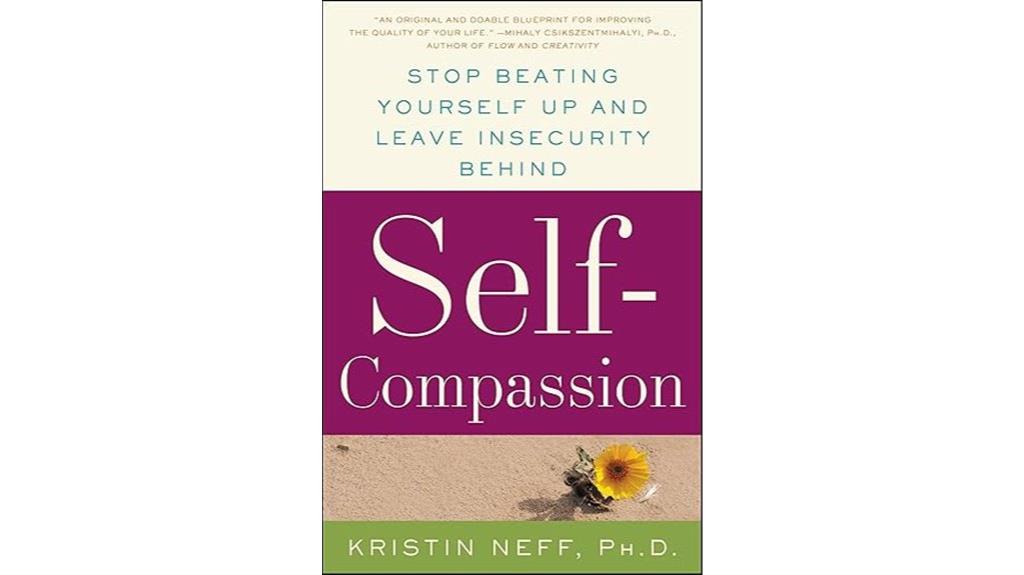
Are you someone who struggles with self-criticism or finds it hard to be kind to yourself? I get it—many of us are our harshest critics. But practicing self-compassion can truly transform your mental health. Kristen Neff’s research shows that being kind to yourself, especially through mindfulness and acceptance, can lead to incredible breakthroughs—sometimes even surpassing therapy or medication. I’ve seen people emerge from long-term depression and anxiety by embracing self-compassion. It helps normalize mistakes, foster resilience, and develop genuine inner peace. Turning that inner critic into a supportive voice isn’t easy, but it’s a proven path to lasting healing.
Best For: individuals seeking a compassionate, practical guide to improve mental health, reduce self-criticism, and foster resilience through self-kindness and mindfulness.
Pros:
- Accessible and engaging style that simplifies complex concepts with humor and relatability
- Incorporates practical exercises and real-life examples to deepen understanding and emotional breakthroughs
- Offers a gentle, non-judgmental approach suitable for those hesitant to seek therapy or new to self-compassion practices
Cons:
- Some readers may find repetitive content or wish for more varied language around themes like equanimity
- The focus on self-compassion may require consistent effort and patience to see long-term results
- Slightly limited depth for those seeking advanced or more comprehensive psychological techniques
Mindfulness and Self-Compassion Workbook for Kids
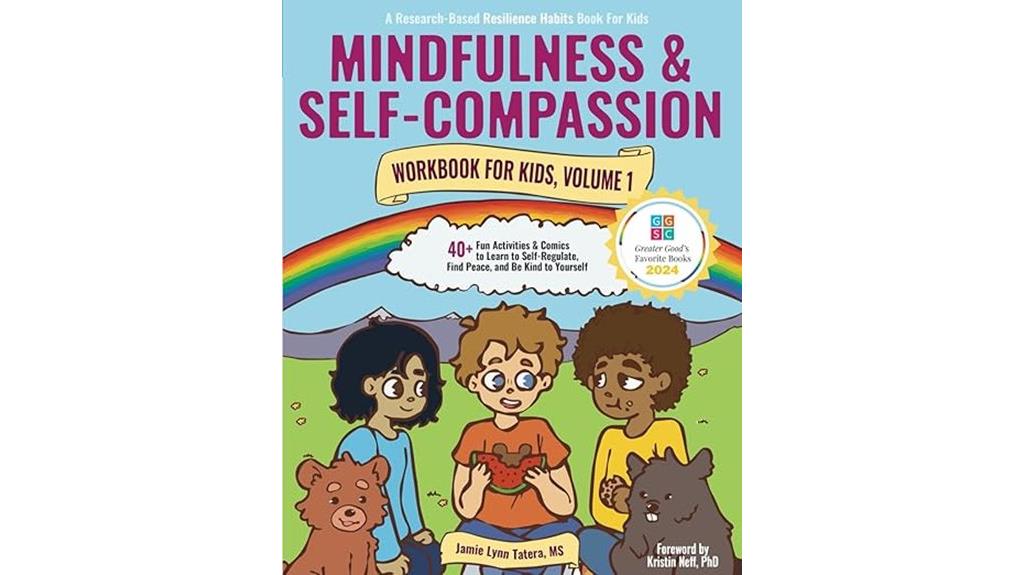
If you’re looking for an engaging, research-based resource to help children build emotional resilience and self-awareness, the “Mindfulness and Self-Compassion Workbook for Kids, Volume 1” by Jamie Lynn Tatera is an excellent choice. This workbook offers over 40 fun activities, comics, and vibrant illustrations that make complex emotional concepts accessible. It guides children in recognizing feelings, practicing acceptance, and developing kindness toward themselves and others. Designed for parents, teachers, and caregivers, it promotes mindfulness, self-compassion, and emotional intelligence through relatable scenarios and engaging visuals. This resource effectively fosters long-term resilience and empathy in children in a playful, meaningful way.
Best For: parents, teachers, caregivers, and mental health professionals seeking an engaging, research-based tool to teach children emotional resilience, mindfulness, and self-compassion.
Pros:
- Over 40 fun activities, comics, and vibrant illustrations make learning engaging and accessible.
- Focuses on important emotional skills like recognizing feelings, acceptance, and kindness in a playful format.
- Suitable for a wide age range and adaptable for use in classrooms, therapy, or at home.
Cons:
- May require adult guidance for younger children to fully engage with some activities.
- The colorful and busy layout might be overwhelming for some children with sensory sensitivities.
- As a physical workbook, it needs to be purchased, which could be a barrier for some families or institutions.
Self-Compassion Daily Journal with Acceptance and Commitment Therapy
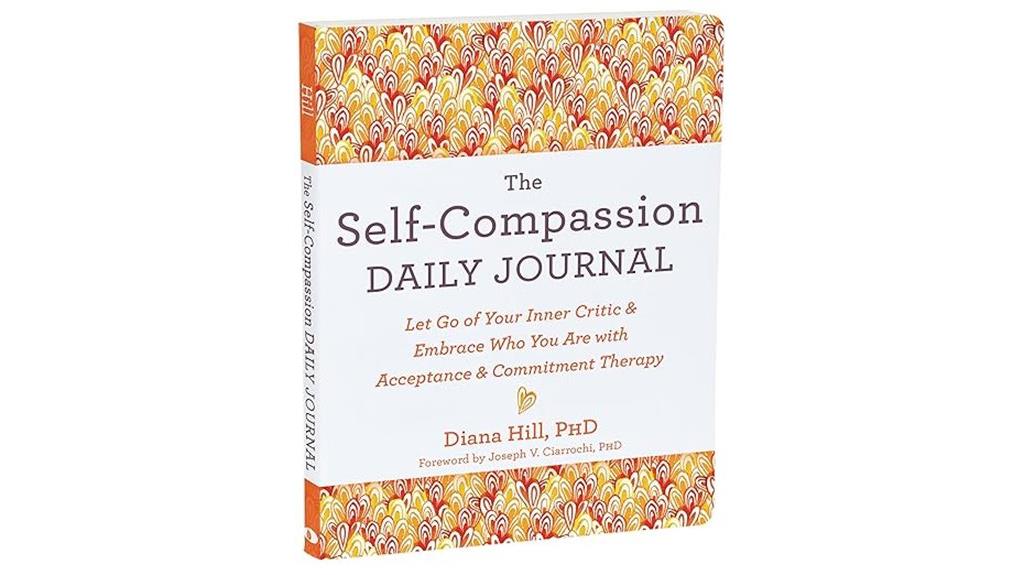
Individuals who struggle with self-criticism and seek a practical, evidence-based way to cultivate self-compassion will find the Self-Compassion Daily Journal with Acceptance and Commitment Therapy (ACT) to be an invaluable tool. Created by Dr. Diana Hill, this journal simplifies the process of letting go of inner critics and embracing acceptance through proven strategies. Its flexible, easy-to-follow format encourages daily practice over eight weeks, leading to improved well-being, reduced anxiety, and stronger self-love. Many users report feeling calmer, more present, and better equipped to handle life’s challenges. The journal’s warmth, practicality, and scientific backing make it a powerful resource for personal growth.
Best For: individuals seeking a practical, evidence-based approach to overcoming self-criticism and cultivating self-compassion through daily, manageable practices.
Pros:
- Easy-to-follow, flexible format that encourages consistent daily practice over eight weeks
- Combines scientifically supported strategies with warm, heartfelt guidance, making it accessible and engaging
- Demonstrates measurable improvements in overall well-being, self-love, and emotional resilience
Cons:
- May require commitment to daily journaling, which could be challenging for some users
- Some prompts and exercises might feel repetitive or simple for those seeking more advanced techniques
- Limited to a two-month structure, which may not suit individuals looking for longer-term or more in-depth programs
The Essential Self-Compassion Workbook for Teens
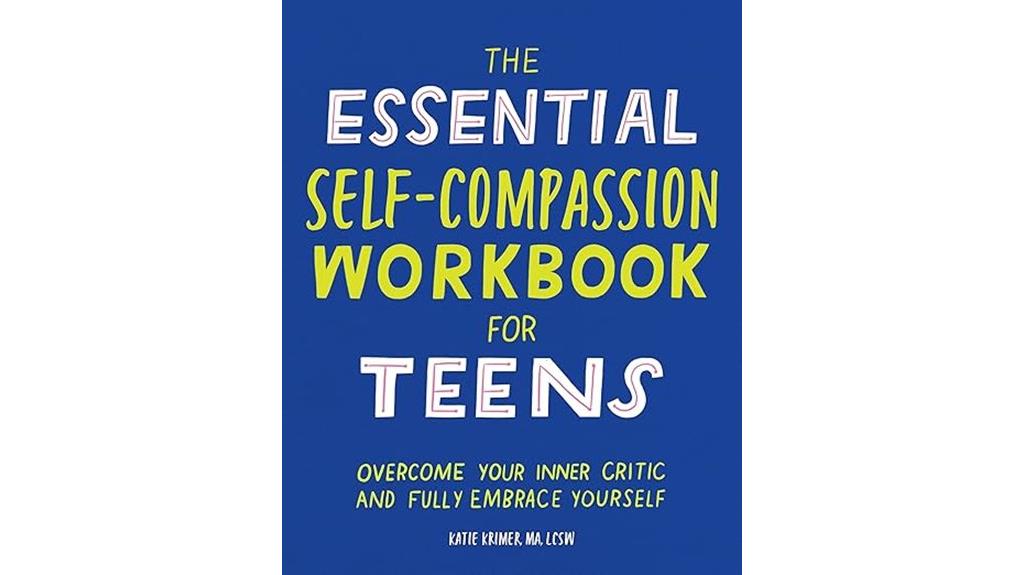
The Essential Self-Compassion Workbook for Teens by Katie Kramer stands out as an ideal resource for teens who struggle with negative self-talk, emotional challenges, or feelings of shame. I find its engaging exercises, colorful artwork, and relatable metaphors make complex concepts like mindfulness and self-kindness accessible. The workbook’s practical tools help teens understand their feelings, reduce shame, and manage emotional struggles effectively. Its gentle, compassionate tone resonates, especially for sensitive or introverted teens. Plus, the inclusion of case studies and reflection spaces encourages ongoing growth. Whether used independently or with support, this workbook empowers teens to build confidence, foster self-compassion, and navigate life’s challenges with kindness.
Best For: Teens who struggle with negative self-talk, emotional challenges, or feelings of shame and are seeking a gentle, practical guide to develop self-compassion and mindfulness.
Pros:
- Engaging exercises, colorful artwork, and relatable metaphors make complex concepts accessible for teens.
- Practical, easy-to-implement tools rooted in mindfulness help reduce shame and improve emotional regulation.
- Suitable for teens, parents, teachers, and therapists, with reflective spaces and case studies supporting ongoing growth.
Cons:
- Some teens may need additional support or guidance to fully benefit from the exercises.
- The workbook’s gentle tone might feel too soft for teens seeking more structured or intensive therapy tools.
- It may require consistent practice over time to see significant changes in self-esteem and emotional resilience.
Self-Love Workbook for Black Women
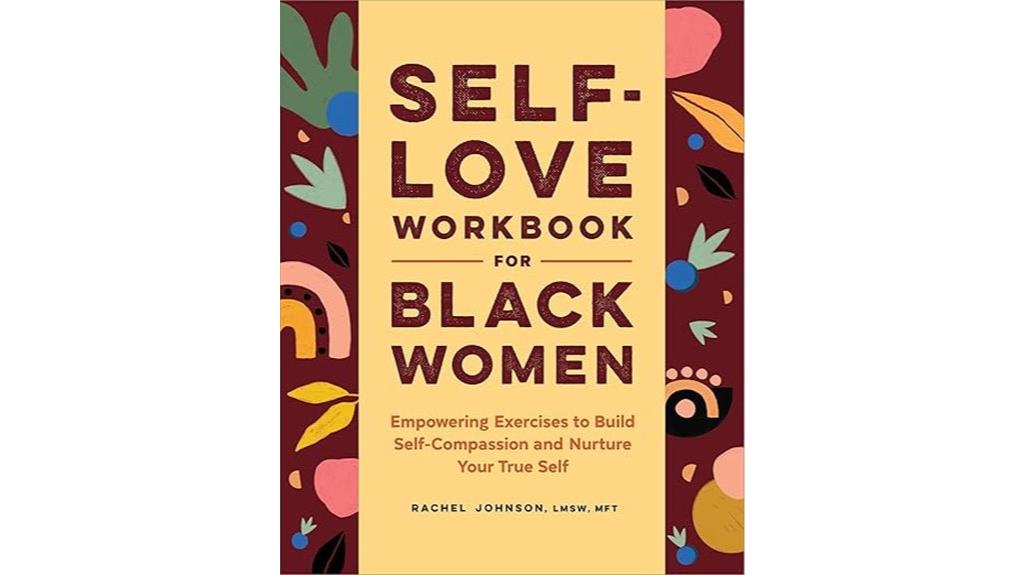
The Self-Love Workbook for Black Women stands out as an essential resource designed specifically for Black women seeking to prioritize their well-being and self-worth. It focuses on self-care, reclaiming confidence, and addressing unique cultural challenges. Through practical exercises, journaling, and reflective passages, it encourages nurturing your true self without feeling overwhelmed. The workbook’s flexible structure allows you to engage at your own pace, making self-love accessible and manageable. Many readers have found it empowering, helping them rebuild confidence, honor their needs, and foster a deeper sense of self-compassion. It truly offers a therapeutic, relatable experience tailored to their journey.
Best For: Black women seeking a culturally resonant, practical self-love resource to rebuild confidence, prioritize self-care, and address unique societal challenges.
Pros:
- Tailored specifically for Black women, addressing unique cultural and societal issues.
- Combines reflective journaling with practical exercises for a therapeutic experience.
- Flexible and concise format, making it easy to engage at one’s own pace.
Cons:
- Some users suggest adding features like spiral binding or tabs for easier use.
- Might feel brief for those seeking more in-depth self-help resources.
- Primarily designed for individual use, which may limit group or guided session applicability.
Factors to Consider When Choosing Self‑Compassion Workbooks

When choosing a self-compassion workbook, I consider my experience level to find one that matches my needs. I look for content that’s relevant and offers practical exercises I can apply easily. It’s also important to pick a format and target audience that resonate with me personally.
Reader Experience Level
Choosing the right self-compassion workbook depends heavily on your experience level and comfort with reflective practices. If you’re new to this, look for books with beginner-friendly language, clear instructions, and simple exercises—these will help you avoid feeling overwhelmed. Conversely, if you’re more experienced, you might prefer workbooks that explore into deeper philosophical ideas, advanced techniques, or integrate other mental health approaches. Your familiarity with mindfulness or therapy concepts also matters; beginners may need foundational explanations, while seasoned readers might seek more nuanced material. For those dealing with trauma or severe issues, choosing workbooks that emphasize safety, grounding, and emotional regulation is vital. Assess your comfort with self-reflection, journaling, and vulnerability to find a workbook suited to your experience level.
Content Relevance and Depth
To find a self-compassion workbook that truly meets your needs, you should carefully consider how well its content aligns with your specific mental health concerns and personal background. For instance, if you’re dealing with trauma or OCD, look for resources that address those issues directly. The depth of material is also important; some workbooks provide gentle introductions suitable for beginners, while others offer advanced exercises for experienced users. Practical activities like journaling, mindfulness, and meditations are essential for active engagement. Additionally, check if the content considers cultural, gender, or age-specific issues relevant to you. Finally, prioritize resources that promote long-term growth through sustainable practices rather than quick fixes, ensuring lasting benefits.
Practical Exercise Quality
The quality of practical exercises in a self-compassion workbook considerably impacts how effectively you’ll develop new skills and integrate them into your daily life. Good workbooks feature simple, accessible practices like journaling, mindfulness, and meditation that fit seamlessly into your routine. These exercises should be evidence-based, grounded in psychological research or proven techniques like ACT or mindfulness. Clear instructions, prompts, and variations are essential to address different emotional states and personal needs. The best resources also include supplemental tools, such as audio meditations or downloadable materials, to boost engagement and consistency. Importantly, exercises should build gradually, allowing you to observe your growth and adapt your strategies over time. This thoughtful progression ensures lasting self-compassion development.
Physical Format Preferences
When selecting a self-compassion workbook, considering its physical format can make a significant difference in how effectively you engage with the material. Do you prefer flipping through pages or using a lightweight, portable e-book? Physical workbooks often feature tactile elements like bookmarks, tabs, or spaces for writing, which can boost interaction and personalization. The size and weight also matter—if you plan to carry it around or use it in therapy sessions, a compact, lightweight option might suit you best. Some physical formats include extras like printed exercises, stickers, or visual aids to promote active participation. Also, think about whether the format allows for easy note-taking, highlighting, or revisiting exercises, supporting ongoing reflection and growth.
Target Audience Alignment
Are you choosing a self-compassion workbook that truly speaks to your needs? It’s essential to pick one tailored to your age, gender, or specific challenges to ensure it feels relevant and engaging. Check if the content addresses your unique experiences or cultural considerations, making the support more meaningful. The tone, language, and activities should match your emotional or developmental level, so you feel comfortable and motivated. Look for relatable examples and prompts that resonate with your daily life. Also, consider whether the exercises target your particular goals—whether it’s building self-esteem, healing from trauma, or managing mental health. Aligning the workbook with your personal context increases its effectiveness, helping you foster genuine kindness and confidence.
Frequently Asked Questions
How Do I Choose a Self-Compassion Workbook Suitable for My Age?
Ever wondered how to pick a self-compassion workbook that fits your age? I’d suggest looking for one tailored to your life stage or age group, with language and examples that resonate with you. Consider your goals—are you seeking stress relief, confidence, or kindness? I recommend browsing reviews or sample pages to see if the tone feels right. After all, a workbook that speaks to your experience makes the journey more meaningful.
Can Self-Compassion Workbooks Address Specific Mental Health Conditions Effectively?
Self-compassion workbooks can be helpful, but they might not fully address specific mental health conditions. I’ve found that they’re great for building resilience and kindness, yet if you’re dealing with serious issues like depression or anxiety, professional therapy is usually more effective. I recommend using workbooks as a supplementary tool alongside therapy, ensuring you get targeted support while fostering self-kindness.
Are There Workbooks Tailored for Different Cultural Backgrounds?
You’re wondering if there are workbooks tailored for different cultural backgrounds. I believe yes, many workbooks now recognize cultural diversity and include tailored exercises and language that resonate more deeply. I’ve seen resources that address specific cultural values and experiences, making self-compassion more accessible and meaningful. It’s important to find one that respects your background, so you can truly connect with the process and foster confidence in your unique identity.
How Long Should I Commit to Using a Self-Compassion Workbook?
Thinking about how long to stick with a self-compassion workbook is like planting a seed—you’ll want to nurture it consistently. I recommend committing at least 4 to 8 weeks, giving yourself time to absorb and practice new skills. But remember, everyone’s journey is unique. Stay flexible, and if you feel drawn to continue beyond that, go for it. Progress is a marathon, not a sprint.
Can Self-Compassion Workbooks Be Used Alongside Therapy or Medication?
Absolutely, I believe self-compassion workbooks can complement therapy or medication wonderfully. I’ve found that they enhance self-awareness and kindness, which supports my mental health journey. While they’re helpful, I always check with my therapist or doctor to guarantee everything aligns well. Combining these tools creates a stronger, more balanced approach to healing and growth, making me feel more confident and compassionate toward myself.
Conclusion
Ultimately, embracing a self-compassion workbook is like gently tending to a delicate garden—each page a carefully planted seed of kindness and understanding. As you nurture this inner landscape, you’ll find your confidence blossoming quietly, even in the smallest moments. Remember, this journey is a tender dance of patience and gentle growth. I encourage you to select a guide that resonates with your unique rhythm, allowing your self-love to flourish naturally and gracefully.











